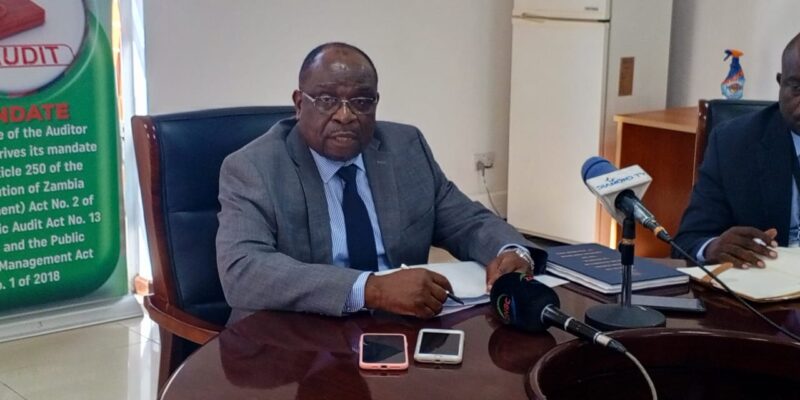The Auditor General’s report on the Audit of Accounts of Local Authorities for the financial year ending December 2023 has highlighted minimal improvements in financial management, combined with significant internal control and operational weaknesses in certain Councils.
The report, tabled before the National Assembly on Monday, December 10, 2023, covered all 116 local authorities across Zambia.
It provided audit opinions on the financial statements of each authority for the period under review, alongside a comparison to the 2022 financial statements.
According to the report, there was significant improvement in the number of local authorities receiving unmodified audit opinions.
In 2023, 113 out of 116 local authorities received unqualified opinions, up from 77 in 2022.
This translated to 97 percent of local authorities having financial statements free from material misstatements or omissions, according to Auditor General, Dr. Ron Mwambwa.
“This means that 97 percent of the local authorities were issued with unmodified audit opinions, indicating that their financial statements were free from material misstatements or omissions,” Mwambwa said.
However, the report also revealed concerning financial issues.
A total of 109 councils owe K3,522,262,654 in outstanding taxes, pension contributions, insurance premiums, and payments for goods and services, some of which have been pending since 2013.
Mwambwa warned that such financial failures could disadvantage employees in terms of their benefits upon leaving service.
“The implication for this failure is that this may disadvantage employees of their benefits at the time of leaving service,” he said.
Further findings showed that, by October 31, 2024, only 22 percent of the targeted revenue—amounting to K315,413,959—had been collected from property rates, site rents, billboard levies, and personal taxes, leaving a balance of K1,131,802,290 uncollected.
This shortfall undermined the government and institutions’ ability to provide essential social services and improve operations.
“Zambia is deprived of the much-needed revenue for the provision of social services for improved service delivery and operations,” Mwambwa noted.
The audit also found that 33 councils had overstaffed positions, with a surplus of 232 staff members paid K16,502,053 in salaries for positions they may not have been qualified for.
A total of 237 employees across 42 councils lacked the required educational or professional qualifications for their positions.
“237 members of staff at 42 councils did not meet the requisite educational and professional qualifications for the positions they were holding,” Mwambwa stated.
Despite these challenges, 116 councils set out to implement programmes in support of the Decentralisation Policy and the 8th National Development Plan.
However, as of December 31, 2023, only six councils had met their targets, while the remaining 110 had either partially achieved or failed to meet them altogether.
“Other findings raised in this Report include: Failure to prepare/manage valuation rolls, failure to control markets, failure to develop integrated development plans, poor management of solid waste, failure to fill vacant positions,” Mwambwa highlighted.
Additional concerns raised in the report include failure to employ temporary workers, failure to secure properties with title deeds, failure to insure properties, failure to maintain council properties, and failure to install and maintain street lights.
The acting Auditor General warned that these issues could lead to unplanned settlements, poor waste management, and overall poor service delivery.
He expressed concern that local authorities, which were expected to provide essential services, had shown poor governance in managing public resources.
Read More: Auditor-General denies allegations of late submission of 2023 financial report
“The implications of the above findings range from the country having unplanned settlements, poor management of waste, to poor service delivery, among others,” Mwambwa said.
The Auditor General recommended that local authorities prioritize the timely achievement of annual targets, economic use of project funds, and effective revenue and expenditure management.
He urged those responsible for managing these resources to address the identified issues urgently to ensure better service delivery and development at the local level.
Mwambwa appealed to those charged with the responsibility to manage resources to address the issues raised seriously and urgently if local authorities are to provide quality service delivery and development in their respective communities.
WARNING! All rights reserved. This material, and other digital content on this website, may not be reproduced, published, broadcast, rewritten or redistributed in whole or in part without prior express permission from ZAMBIA MONITOR.












Comments